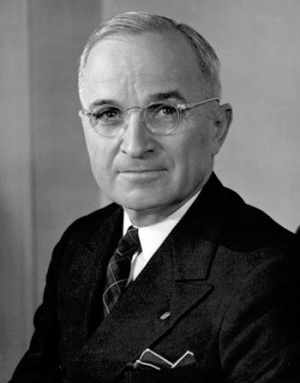Harry S. Truman
 | ||||||||||||||||||
| Born | May 8, 1884 | |||||||||||||||||
| Died | December 26, 1972 (Age 88) | |||||||||||||||||
| Member of | Phi Beta Kappa | |||||||||||||||||
| ||||||||||||||||||
Contents
National Security Act of 1947
Truman signed the National Security Act of 1947 and reorganized military forces by merging the Department of War and the Department of the Navy into the National Military Establishment (later the Department of Defense) and creating the U.S. Air Force.
Creation of the CIA
Russ Baker notes that Truman was very reluctant to sign the act since it also created the CIA and the National Security Council. He apparently didn't see the need for an organisation such as the CIA in peacetime, but was persuaded to sign off on it against his better judgment, something that he later came to regret.[1][2]
Call for reform of the CIA
One month after the JFK Assassination, Truman wrote a letter to the New York Times, in which he noted that "for some time I have been disturbed by the way CIA has been diverted from its original assignment. It has become an operational and at times a policy-making arm of the Government."[3] He called for reform of the CIA, opining that "there is something about the way the CIA has been functioning that is casting a shadow over our historic position and I feel that we need to correct it."[3] It is unclear whether he was aware of its role in JFK's assassination, or whether this timing is coincidental. Either way, the letter was broadly ignored and the call for reform was not taken up.
A Document by Harry S. Truman
| Title | Document type | Publication date | Subject(s) | Description |
|---|---|---|---|---|
| Document:Limit CIA Role To Intelligence | letter | 22 December 1963 | CIA | A letter just after the assassination of JFK which was published once and then vanished down the memory hole. |
A Quote by Harry S. Truman
| Page | Quote | Date |
|---|---|---|
| Encyclopedia of Domestic Assassinations | <nowiki>“[[[Secretary-General of the United Nations]] Dag Hammarskjöld] was on the point of getting something done when they killed him. Notice that I said "when they killed him."”</nowiki> | 1961 |
An appointment by Harry S. Truman
| Appointee | Job | Appointed | End |
|---|---|---|---|
| David Bruce | US/Ambassador/France | 17 May 1949 | 10 March 1952 |
Related Document
| Title | Type | Publication date | Author(s) | Description |
|---|---|---|---|---|
| Document:Reflection on the Role of the U.S. Vice Presidency | Article | 25 September 2024 | Ludwig De Braeckeleer | On 12 April 1945, Vice President Truman was preparing to have a drink in House Speaker Sam Rayburn’s office when he received an urgent message to go immediately to the White House, where Eleanor Roosevelt told him that her husband had died after a massive cerebral hemorrhage. Suddenly, the ‘piano player’ was responsible for overseeing the final phase of World War II and shaping the postwar global order: Truman Doctrine, Marshall Plan, NATO, and the UN. |